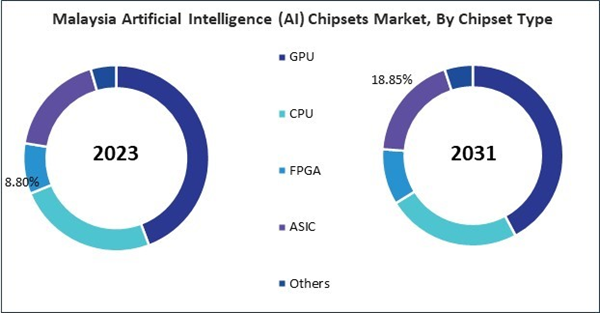The China market dominated the Asia Pacific Artificial Intelligence (AI) Chipsets Market by Country in 2023, and would continue to be a dominant market till 2031; thereby, achieving a market value of$21.51 billion by 2031. The Japan market is registering a CAGR of 29.7% during (2024 - 2031). Additionally, The India market would showcase a CAGR of 31.2% during (2024 - 2031).
The adoption of AI chipsets is rapidly increasing across various industries and sectors due to their ability to accelerate AI tasks, enhance performance, and enable intelligent applications. Businesses increasingly leverage AI-driven solutions to gain insights from data, automate processes, improve decision-making, and enhance customer experiences. AI chipsets facilitate the execution of complex AI algorithms and machine learning models, driving applications like NLP, computer vision, predictive analytics, and autonomous systems.
Moreover, the continuous advancements in AI algorithms, deep learning models, and neural network architectures drive the need for high-performance hardware solutions capable of handling massive datasets and complex computations. AI chipsets provide the computational power and efficiency to effectively train and deploy AI models. The proliferation of edge computing architectures, wherein AI processing tasks are performed locally on edge devices, drives the adoption of AI chipsets with edge computing capabilities.
The fintech industry in India has experienced rapid growth driven by increasing smartphone penetration, digital payment adoption, and government initiatives promoting financial inclusion. The Fintech business in India is expanding at one of the quickest rates in the world, according to the National Investment Promotion and Facilitation Agency. The market for fintech in India is expected to reach $150 billion by 2025, from $50 billion in 2021. By 2030, the fintech business is expected to generate $2.1 trillion in opportunity. In 2022, fintech startups in India raised $5.65 billion. Between 2021 and 2022, the number of distinct institutional investors in Indian fintech nearly doubled, from 535 to 1019, respectively.
Additionally, as businesses and government agencies in Australia invest in AI technologies to drive innovation and efficiency, there is a growing demand for AI chipsets to power AI-driven applications and services. According to the Australian Government, digital innovations, including AI, could contribute $315 billion to Australia’s GDP by 2030. Australian spending on AI systems will grow to over $3.6 billion by 2025, at a compounding annual growth rate of 24.4% between 2020 and 2025. Therefore, the rising fintech industry and increasing expenditure on AI technology in the region drive the market's growth.
Based on Computing Technology, the market is segmented into Cloud Computing and Edge Computing. Based on Function, the market is segmented into Inference and Training. Based on Chipset Type, the market is segmented into GPU, CPU, FPGA, ASIC, and Others. Based on Vertical, the market is segmented into Consumer Electronics, Automotive, Healthcare, Manufacturing, Retail & E-Commerce, BFSI, Marketing, and Others. Based on countries, the market is segmented into China, Japan, India, South Korea, Taiwan, Malaysia, and Rest of Asia Pacific.
List of Key Companies Profiled
- Intel Corporation
- NVIDIA Corporation
- IBM Corporation
- Micron Technology, Inc.
- Qualcomm Incorporated (Qualcomm Technologies, Inc.)
- Samsung Electronics Co., Ltd. (Samsung Group)
- Apple, Inc.
- Huawei Technologies Co., Ltd. (Huawei Investment & Holding Co., Ltd.)
- Texas Instruments, Inc.
- NXP Semiconductors N.V.
Market Report Segmentation
By Computing Technology- Cloud Computing
- Edge Computing
- Inference
- Training
- GPU
- CPU
- FPGA
- ASIC
- Others
- Consumer Electronics
- Automotive
- Healthcare
- Manufacturing
- Retail & E-Commerce
- BFSI
- Marketing
- Others
- China
- Japan
- India
- South Korea
- Taiwan
- Malaysia
- Rest of Asia Pacific
Table of Contents
Companies Mentioned
- Intel Corporation
- NVIDIA Corporation
- IBM Corporation
- Micron Technology, Inc.
- Qualcomm Incorporated (Qualcomm Technologies, Inc.)
- Samsung Electronics Co., Ltd. (Samsung Group)
- Apple, Inc.
- Huawei Technologies Co., Ltd. (Huawei Investment & Holding Co., Ltd.)
- Texas Instruments, Inc.
- NXP Semiconductors N.V.









